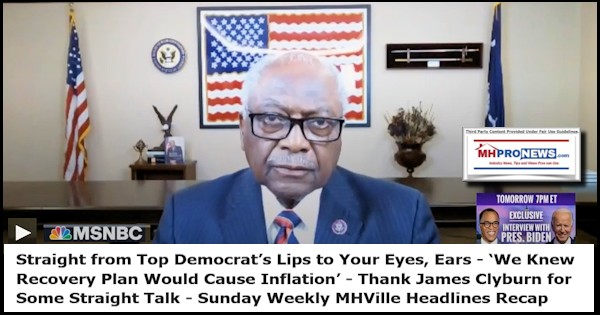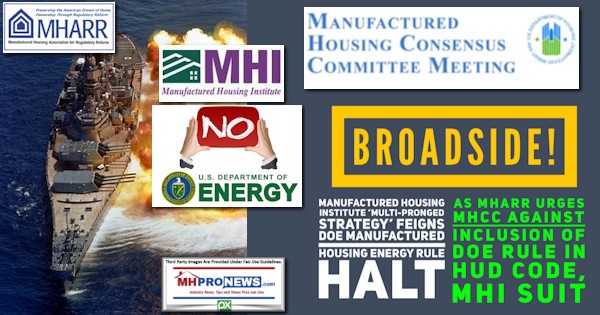
A new Masthead editorial encouraged appropriate litigation by the Manufactured Housing Institute (MHI). That Masthead also urged that MHI ‘come clean’ with the manufactured home industry on evidence-based allegations including insider information from the Department of Energy (DOE) plus other evidence that MHI has been a marginally veiled part of the energy rule problem for years. In the wake of those Masthead remarks the Manufactured Housing Association for Regulatory Reform (MHARR) has come out with guns blazing urging the best ways for MHI to stop the rapidly approaching Department of Energy’s (DOE) costly manufactured home energy rule. In a more authentic ‘multipronged strategy,’ MHARR has formally given notice to the Manufactured Housing Consensus Committee (MHCC)
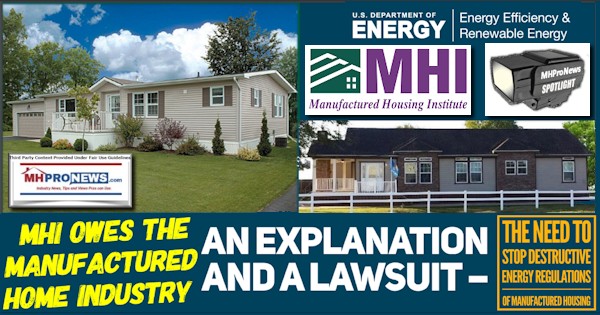
The MHARR media release and related in depth comments to the Manufactured Housing Consensus Committee (MHCC) are found below.

NOVEMBER 14, 2022
TO: HUD CODE MANUFACTURED HOUSING INDUSTRY MEMBERS
FROM: MHARR
RE: MHARR COMMENTS OPPOSE INCORPORATION OF DOE ENERGY STANDARDS WITHIN THE HUD CODE
The Manufactured Housing Association for Regulatory Reform (MHARR) has filed written comments (copy attached) with the Manufactured Housing Consensus Committee (MHCC) opposing the incorporation or summary “alignment” of U.S. Department of Energy (DOE) manufactured housing “energy conservation” standards within the Federal Manufactured Housing Construction and Safety Standards (FMHCSS) maintained by the U.S. Department of Housing and Urban Development. MHARR’s November 9, 2022 comments were submitted in advance of a scheduled November 17-19, 2022 MHCC meeting in Washington, D.C., to consider the integration of the DOE final energy standards with the FMHCSS.
Both the excessive cost of the DOE energy rule and its complete unsuitability for manufactured housing and the manufactured housing market, as well as the legal mangle now facing HUD (and DOE) with respect to the enforcement of the standards, could have been avoided if DOE had properly consulted with HUD and the MHCC – as required by section 413 of the Energy Independence and Security Act of 2007 (EISA) – from the very start. Instead, DOE unlawfully relegated such “consultation” to meaningless after-the-fact activity, while MHI urged and supported the sham “negotiated rulemaking” used by DOE and its energy/climate special interest allies to sidestep the type of real and legitimate consultation that could have avoided the current morass. Now, the industry faces the consequences of that instinct to “go along,” as the DOE energy standards are slated to go into effect on May 31, 2023.
While MHARR has called for MHI to lead an industry lawsuit to obtain an injunction against the DOE standards as the only available remedy that could be secured in time to stop those baseless and unlawful standards, MHI, instead, is stubbornly pursuing corrective legislation as part of a so-called “multi-pronged” strategy. In the wake of the November 8, 2022 election, however, it is – or should be – obvious that a legislative remedy is simply not in the cards, with razor-thin results in both houses guaranteeing that a presidential veto would be all but impossible to overturn (even if such legislation could ever be secured in the first place).
As a result, litigation remains the only potential remedy that could stop the DOE standards before they begin doing severe damage to the industry.
Consistent with this approach, MHARR’s comments strongly oppose the wholesale incorporation of the DOE standards within the HUD Code, or the incorporation of any “aligned” variant of the DOE standards without full notice and comment rulemaking as required by federal manufactured housing law.
MHARR will continue its consistent and aggressive opposition to the implementation of the excessively costly and destructive DOE manufactured housing energy standards and will continue to urge MHI-led industry legal action to enjoin those standards prior to their scheduled May 31, 2023 implementation date.
The Manufactured Housing Association for Regulatory Reform is a Washington, D.C.-based national trade association representing the views and interests of independent producers of federally-regulated manufactured housing.
— 30 —
Manufactured Housing Association for Regulatory Reform (MHARR)
1331 Pennsylvania Ave N.W., Suite 512
Washington D.C. 20004
Phone: 202/783-4087
Fax: 202/783-4075
Email: MHARR@MHARRPUBLICATIONS.COM
Website: manufacturedhousingassociation.org
November 9, 2022
VIA ELECTRONIC SUBMISSION
Manufactured Housing Consensus Committee
C/O Home Innovation Research Labs
Administering Organization
400 Prince George’s Boulevard
Upper Marlboro, Maryland 20774
Re: Energy Conservation Standards for Manufactured Housing
Dear Members of the Manufactured Housing Consensus Committee:
The following comments are submitted on behalf of the Manufactured Housing Association for Regulatory Reform (MHARR). MHARR represents independent producers of manufactured housing from all regions of the United States.
I. BACKGROUND
On September 21, 2022, the U.S. Department of Housing and Urban Development (HUD) published notice of Manufactured Housing Consensus Committee (MHCC) meetings in October and November 2022, to ostensibly develop recommendations to “align”[1] the Federal Manufactured Housing Construction and Safety Standards (FMHCSS) administered by HUD[2] with the energy conservation standards for manufactured housing adopted by the U.S. Department of Energy (DOE) on May 31, 2022.[3] For the following reasons, however, the final manufactured housing energy conservation final standard adopted by DOE cannot lawfully be incorporated within – or summarily “aligned” with – the HUD FMHCSS standards consistent with the law governing both those standards and the HUD manufactured housing program. As a result, the MHCC should adopt and submit to HUD resolutions which:
- (1) Reject any such incorporation (or summary “alignment”) of the DOE final standard into the HUD Part 3280 standards; and
- (2) Affirm that any such DOE standard, which cannot lawfully be and is not incorporated within the FMHCSS standards, cannot be enforced pursuant to or subject to inspection or consumer complaint procedures applicable to FMHCSS standards under 24 C.F.R. 3282.
The bases for this position are set forth in greater detail below.
II. COMMENTS
(A) THE DOE FINAL ENERGY STANDARD CANNOT LAWFULLY BE INCORPORATED WITHIN THE FMHCSS
As DOE recognized in a previous rulemaking, the statutory authority for the promulgation and adoption of its May 31, 2022 final energy standards for manufactured homes, is completely separate, distinct and independent from the statutory authority for the promulgation, adoption and enforcement of FMHCSS standards by HUD.[4] DOE thus developed, proposed and adopted the May 31, 2022 manufactured housing energy standards pursuant to section 413 of the Energy Independence and Security Act of 2007 (EISA).[5] In relevant part, that section directs the Secretary of DOE, “not later than four years after December 19, 2007,” to establish, “by regulation, “standards for energy efficiency in manufactured housing.” Section 413, however, by its express terms, does not mandate, direct, authorize or even mention the incorporation, adoption or “alignment” of any such DOE standards into or within the FMHCSS standards.[6] Nor does it establish an independent enforcement mechanism for DOE to investigate, ascertain, or determine compliance with those standards when they go into effect, stating only that “any manufacturer of manufactured housing that violates a provision of the” DOE energy standards, “is liable to the United States for a civil penalty in an amount not exceeding 1 percent of the manufacturer’s retail list price of the manufactured housing.”
In contrast to the DOE manufactured housing energy standard, FMHCSS standards are developed, promulgated, adopted and enforced pursuant to the National Manufactured Housing Construction and Safety Standards Act of 1974 (1974 Act), as amended by the Manufactured Housing Improvement Act of 2000 (2000 reform law). Those laws prescribe: (1) the subject areas that can be addressed by FMHCSS standards; (2) the criteria and considerations that relate to and govern the promulgation and adoption of such standards; (3) the procedures that must be followed to promulgate and adopt such standards; (4) a comprehensive mechanism for inspections to determine compliance with those standards; and (5) remediation and consumer protection provisions.
As one of their highest policy priorities, the laws governing the FMHCSS standards and the HUD manufactured housing program require that FMHCSS standards be cost effective and maintain the purchase price affordability of manufactured housing. The 1974 Act, as amended, therefore, affirmatively mandates that the MHCC in recommending FMHCSS standards and HUD, in adopting FMHCSS standards:
- (1) “Facilitate the availability of affordable manufactured homes;”
- (2) “Increase homeownership for all Americans;”
- (3) “Ensure that the public interest in, and need for, affordable manufactured housing is duly considered in all determinations relating to the Federal standards and their enforcement;” and
- (4) “Consider the probable effect of such standard on the cost of the manufactured hometo the public;”
(Emphasis added). Applicable law, accordingly, unambiguously requires that each and every FMHCSS within the HUD Code meet these criteria, among others. This includes, moreover, outside or “foreign” standards incorporated within the Part 3280 FMHCSS standards, which must independently satisfy and comply with these and all other applicable statutory criteria.
As MHARR has previously demonstrated to the MHCC and in the DOE rulemaking, however, the DOE final manufactured housing energy standards do not and cannot satisfy the cost-effectiveness and cost-benefit balancing criteria of the 1974 Act as amended.[7] By DOE’s own admission in the rulemaking process, the final energy standard would result in a retail-level price increase of nearly $6,000 for a double-section home in the most stringent thermal zone (and would actually be even higher, according to MHARR data). By contrast, according to DOE, the final standard would “save … $475 per year in multi-section homes on their utility bills.”[8] At that rate, even assuming DOE’s figures are accurate, a homeowner would have to wait nearly 13 years to recoup the cost of the DOE energy standards, yet industry data indicates that the average ownership tenure of a manufactured home is significantly shorter. Moreover, and more importantly, however, the cost increase attributable to the energy standard, as calculated by DOE, necessarily understates its full cost in multiple respects, as MHARR has previously demonstrated. Thus, among other things, DOE’s cost estimate:
- (1) Fails to include the cost of enforcement, testing and regulatory compliance;[9]
- (2) Fails to account for the full cost effect of rampant inflation;
- (3) Fails to account for the cost impact of triennial International Energy Conservation Code (IECC) updates; and
- (4) Fails to account for the cost of regulatory uncertainty related to such updates and arbitrary DOE modifications and alterations to IECC code provisions.
Thus, based on the cost data that exists, as well as the cost data that DOE has failed to develop but will obviously and substantially increase the cost of the DOE standard and simultaneously negate any conceivable cost-benefit that such a standard could have for any consumer anywhere in the United States, the DOE standard fails to meet the statutory criteria of the 1974 Act, as amended, for FMHCSS standards and, as a matter of law, cannot be incorporated, in its present form, within the FMHCSS standards.[10]
Moreover, in the absence of an express statutory directive mandating either the verbatim incorporation of the DOE standard within the HUD Code, or the “alignment” of the FMHCSS standards with the DOE standard — as was the case with EPA formaldehyde standards noted above — any altered or modified (“aligned”) variant of the DOE final standard slated for incorporation within the FMHCSS standards, by law, would need to be published as a proposed rule, with substantiating cost-benefit calculations, and made available for public comment as with any other proposed FMHCSS standard.[11] Accordingly, any modification of the DOE standard recommended by the MHCC should and must be subject to further rulemaking proceedings in accordance with both the 1974 Act, as amended and the Administrative Procedure Act (APA).
Regardless of any further recommendation that it may make, however, the MHCC should go on record with a statement:
- (1) Declaring that the May 31, 2022 final standard adopted by DOE is not appropriate for manufactured housing;
- (2) Declaring that the May 31, 2022 DOE final standard is inconsistent with the construction of manufactured homes; and
- (3) Declaring that the May 31, 2022 DOE final standard would not be cost-beneficial and would be destructive of the fundamental affordability of manufactured housing in violation of applicable federal law.
The MHCC offered similar comments with respect to the proposed DOE manufactured housing energy standard and should be consistent by reiterating its position with respect to the May 31, 2022 DOE final published standard.
B) UNINCORPORATED “FOREIGN” STANDARDS CANNOT BE ENFORCED BY HUD UNDER PART 3282
Further, HUD’s Procedural and Enforcement Regulations (PER) – and the regulatory enforcement apparatus established by those regulations — by law, pertain specifically and exclusively to the enforcement of FMHCSS standards. By contrast, the PER regulations are not an open warrant that can be applied to or used to enforce any standard, for any purpose, from any agency.
Specifically, 24 C.F.R. 3282.1 provides, in relevant part:
“(b) The Secretary is also authorized by the Act to conduct inspections and investigations necessary to enforce the standards, to determine that a manufactured home fails to comply with an applicable standard or contains a defect or an imminent safety hazard, and to direct the manufacturer to furnish notification thereof, and in some cases, to remedy the defect or imminent safety hazard.
(Emphasis added). The PER regulations, in turn, define “standards” to include only FMHCSS standards adopted under authority of the 1974 Act, as amended. Thus, PER section 3282.7(hh) states:
(hh) Standards means the Federal manufactured home construction and safety standards promulgated under section 604 of the Act, 42 U.S.C. 5403, as part 3280 of these regulations.
Based on these provisions, HUD and HUD’s manufactured housing inspection, compliance and enforcement system cannot be used to implement the DOE May 31, 2022 final standard because the May 31, 2022 DOE final standard is not at present an FMHCSS standard and because the May 31, 2022 DOE final standard, as promulgated by DOE, cannot be adopted as an FMHCSS standard, insofar as it clearly violates that cost-benefit and other express affordability mandates of the 1974 Act, as amended. Nor can the HUD regulatory enforcement system be applied to any variant of the DOE energy standard unless and until any such variant is adopted as a final FMHCSS standard with full notice and comment rulemaking and the development and publication of full cost-benefit information and analyses.
III. CONCLUSION
For all the foregoing reasons, MHARR urges the MHCC to:
- (1) Reject the incorporation of the DOE May 31, 2022 final manufactured housing energy standard within the FMHCSS;
- (2) Adopt a statement rejecting the May 31, 2022 final DOE manufactured housing energy standard as being inappropriate for manufactured homes and destructive of the affordability of manufactured housing; and
- (3) Assert that HUD adoption of any modified or altered DOE manufactured housing energy standard must be based on a full and valid analysis of all applicable costs and a finding of lawful cost-benefit in accordance with the 1974 Act, as amended, as well as compliance with all applicable procedural requirements of federal law.
Given the complexity of this matter, MHARR will further explain its position at the upcoming November 15-17, 2022 MHCC meeting.
Thank you in advance for your consideration of this matter.
Sincerely,
Mark Weiss
President and CEO
cc: Hon. Marcia Fudge
Hon. Jennifer Granholm
Hon. Julia Gordon
HUD Code Manufactured Housing Industry Members
[1] See, 87 Federal Register, No. 182 (September 21, 2022), “Notice of Federal Advisory Committee Meeting; Manufactured Housing Consensus Committee,” at p.57712, col. 2 (“Given that manufacturers have to comply with the Department of Energy’s Energy Conservation Standards for Manufactured Housing and the [FMHCSS], and HUD’s role in regulating the manufactured housing industry, HUD considers it imperative to promptly proceed with a rulemaking to align the [FMHCSS] with the Department of Energy’s Energy Conservation Standards for Manufactured Housing.”)
[2] See, 24 C.F.R. 3280.
[3] See, 87 Federal Register, No. 104 (May 31, 2022), “Energy Conservation Program; Energy Conservation Standards for Manufactured Housing,” at p.32728, et seq.
[4] C.f. 85 Federal Register, No. 31 (February 14, 2020), “Energy Conservation Program for Appliance Standards; Procedures for Use in New or Revised Energy Conservation Standards and Test Procedures for Consumer Products and Commercial/Industrial Equipment,” at p. 8676, col. 1 (“With respect to MHARR’s suggestion to apply the Process Rule’s provisions to the separate rulemaking on manufactured housing [energy standards] that is currently underway … we note that the statutory authorities for manufactured housing and the appliance [energy] standards that are addressed by this final rule are in separate chapters within Title 42 of the U.S. Code and have no relationship with each other….”) (Emphasis added.)
[5] See, 42 U.S.C. 17071.
[6] Significantly, Congress could have statutorily directed the verbatim incorporation of the DOE standards within the FMHCSS standards – or the “alignment” of the FMHCSS standards with the DOE standards – if it had wanted to do so. For example, Congress, in the Formaldehyde Standards for Composite Wood Products Act of 2010 (P.L. 111-199), directed the Environmental Protection Agency (EPA) to develop and adopt enhanced formaldehyde emission standards for certain specified wood products. It further directed HUD “to update its regulation addressing formaldehyde emission standards” for manufactured homes “to ensure consistency with” the new EPA formaldehyde standards “not later than 180 days” after the promulgation of the EPA standards. See, 84 Federal Register, No. 56 (March 22, 2019) “Streamlining and Aligning Formaldehyde Emission Control Standards for Certain Wood Products in Manufactured Home Construction with Title VI of the Toxic Substance Control Act,” at p. 10739, col. 1. No comparable directive, however, is contained within 42 U.S.C. 17071.
[7] See, detailed analysis set forth in MHCC comments submitted by MHARR dated September 15, 2021 and October 1, 2021. See also, MHARR comments to DOE dated February 25, 2022, among others.
[8] See, DOE News Release, May 18, 2022, “DOE Updates Mobile Home Efficiency Standards to Lower Household Energy Bills,” at p. 2., attached hereto as Attachment 1.
[9] DOE has yet to propose an enforcement mechanism or system for its final manufactured housing standards, and has yet to fully account for the costs arising from such enforcement, despite asserting in another energy standards rulemaking, that “coverage determination[s], test procedure[s] and energy conservation standard rulemakings are interdependent.” See, 86 Federal Register, No. 127 (July 7, 2021), “Energy Conservation Program for Appliance Standards; Procedures, Interpretations and Policies for Consideration in New or Revised Energy Conservation Standards and Test Procedures for Consumer Products and Commercial/Industrial Equipment,” at p. 35672, col. 2.
[10] Any such wholesale incorporation, moreover, would be clearly inconsistent with Congress’ intent in adopting EISA section 413. Obviously, with its standards and enforcement system for manufactured housing fully established, Congress, if it had wanted to, could have expressly provided for HUD enforcement of the DOE standards. It did not do that, however, or even hint at such a result. Consequently, HUD adoption and enforcement of the DOE standard, as published, would be inconsistent with EISA section 413 as written and similarly in violation of Congress’ unambiguous intent.
[11] In accordance with the 1974 Act, as amended, full MHCC and notice and comment procedures apply to the promulgation and adoption of all FMHCSS standards, absent an “emergency” as defined by the Act. Under 42 U.S.C. 5403(b)(5). That section provides, in relevant part, “If the Secretary determines, in writing, that such action is necessary to address an issue on which the Secretary determines that the consensus committee has not made a timely recommendation following a request by the Secretary, or in order to respond to an emergency that jeopardizes the public health or safety, the Secretary may issue an order that is not developed under the procedures set forth in subsection (a) or in this subsection.” There has been no such assertion, however, that the DOE energy conservation rule or any variant thereof addresses a matter which “jeopardizes the public health or safety,” nor could any such claim be legitimately, validly, or plausibly asserted. ##
Additional Information with More MHProNews Analysis and Focused Commentary
MHI admits in writing that this rule will be harmful to the interests of manufactured housing (see other linked items herein). MHARR has been consistent, and previously stopped this rule, despite MHI’s apparent waffling over the years on this DOE issue. The report below is from 2017. It reflects the evolution of how MHARR has led the charge to stop this rule, despite MHI’s head fakes, flip flops, and apparent paltering.

Sources have indicated that the prior members of this coalition that MHARR organized to support their steadfast opposition to this energy rule saw personnel shifts. That said, MHARR found a new ally in what became the Louisiana vs. Biden case.
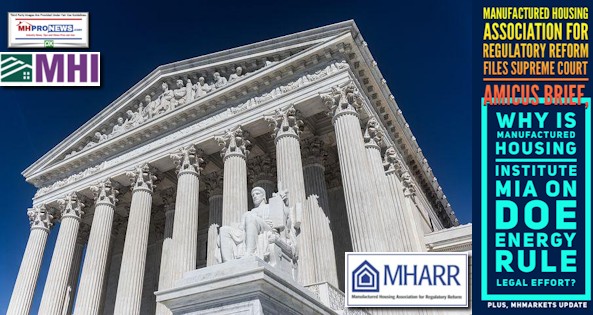
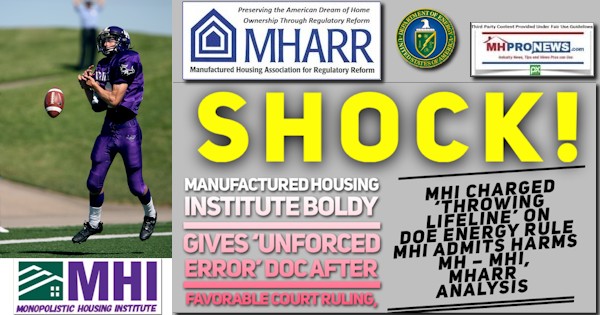
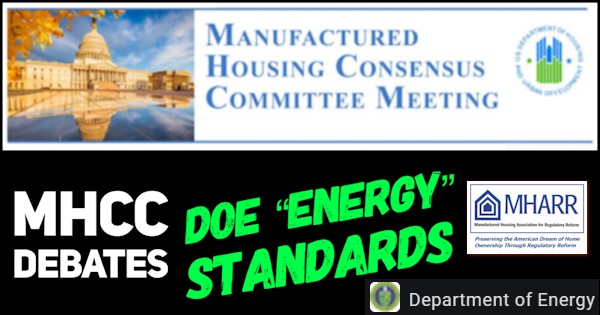
MHProNews has been saying for months that MHI’s strategy is a demonstrably dead-end tactic. It should be obvious that the tepid response that MHI has had from lawmakers and industry members that their so-called legislative approach won’t and can’t work. It certainly will not with Joe Biden in the White House, because the Republicans – even if they eke out a modest majority in both houses of Congress after all the ‘counting’ is done – will not have the veto-proof numbers seated after the 2022 midterms that would be needed. A similar logic that applied to President Barack Obama from former MHI Vice President Jason Boehlert. MHI’s posturing, paltering, and self-congratulations about their ‘access’ doesn’t change these ‘facts on the ground’ realities. The point that MHI has not admitted that everyone that has signed on to their too-little, too late legislative effort are all Republicans only underscores that they have run out of runway for their flawed strategy.
But among the most telling items is the following letter obtained from the DOE that is on MHI letterhead. That letter asks DOE for negotiated rulemaking. Instead of opposing the DOE rule, which MHI admits is harmful and will price out potentially millions of possible manufactured homeowners from being able to buy a new manufactured home, MHI sought a behind the scenes deal with pro-energy rule proponents. See arrows and notes which are added for clarity, plus the linked and related reports for the details.

MHI may or may not do a lawsuit.
MHARR can press them with facts, evidence, and reason. MHProNews/MHLivingNews can press them in a similar fashion.
But the reality is that MHI is ever more apparently operating on an agenda that aims for industry consolidation by their larger members. As odd as it may sound to those who have not been carefully studying MHI’s behavior and the related evidence, the trends are unmistakable. MHI has apparently been slyly working with those who want an energy rule, even as they claimed and postured for years that they oppose such standards.
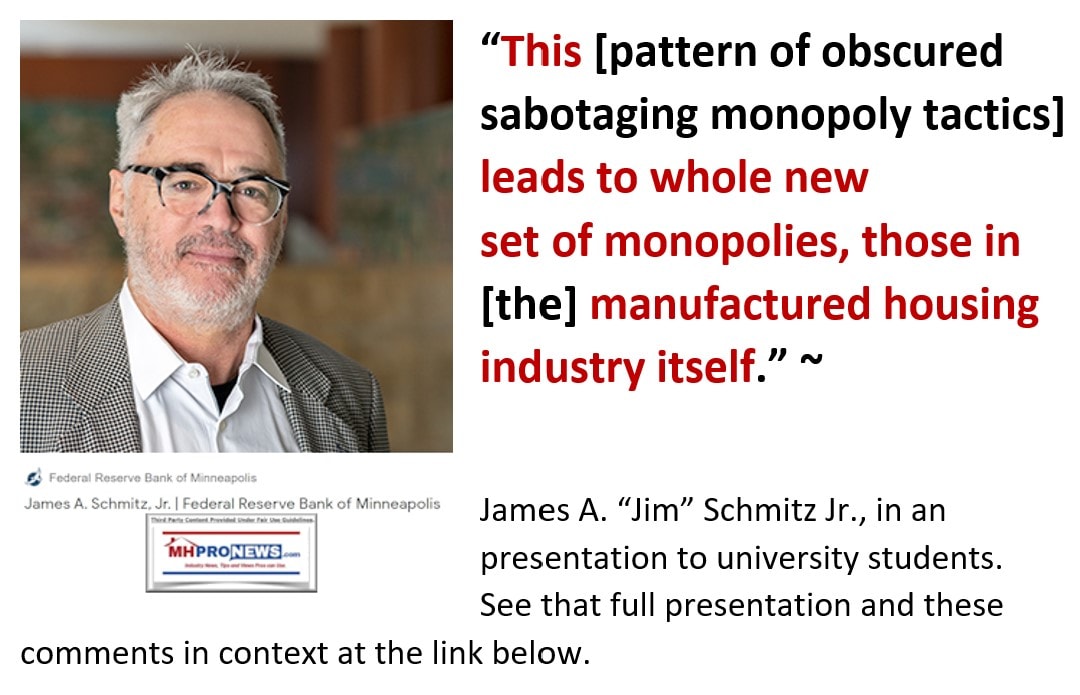
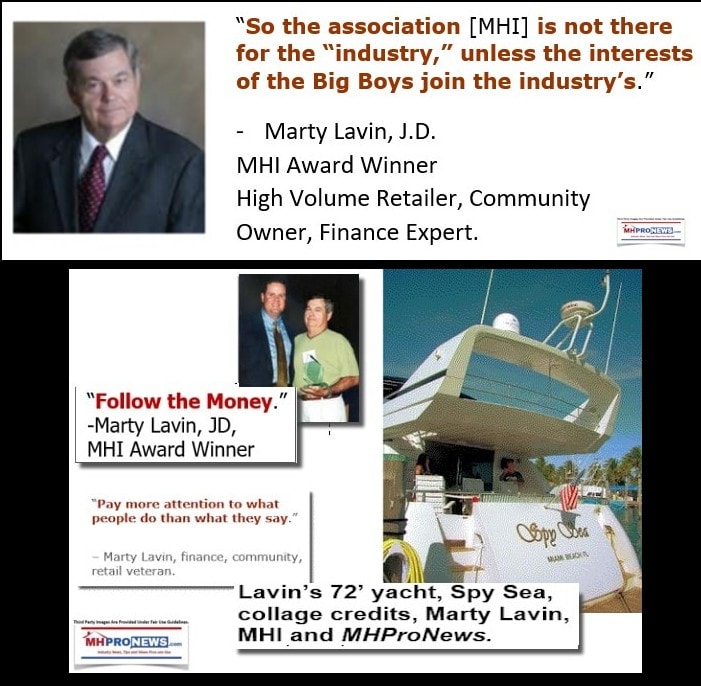
MHI are subverting the manufactured home industry even as they illegitimately claim to be working for “all segments.”
Can MHI still pivot? Sure. Can they mend the fence with MHARR? Sure. Can MHI invest in a proper litigation effort needed to stop this DOE energy rule that they have quietly supported for years? Yes.
The Bottom Lines
But will MHI use common sense instead of hubris and pivot? Only time will tell.
But if MHI fails to pivot in the fashion MHARR has suggested, and if the industry indeed suffers as a result of this oncoming and costly DOE energy rule, then the grounds for litigation against MHI and their dominating members may well be in place.
- Such litigation against MHI and/or their larger members may well include shareholders of MHI’s larger members for not taking the obvious and proper steps needed to stop the DOE rule from taking effect.
- Put differently, MHI and their dominating members may be involved in litigation either way.
- If MHI’s leaders have any integrity, or common sense, their best option is to do what MHARR asks.
These evidence and reasoned based reports and analysis may one day be evidence in court if MHI leaders and their dominating brands fail the interests of “all segments” of the manufactured housing industry once again. ##


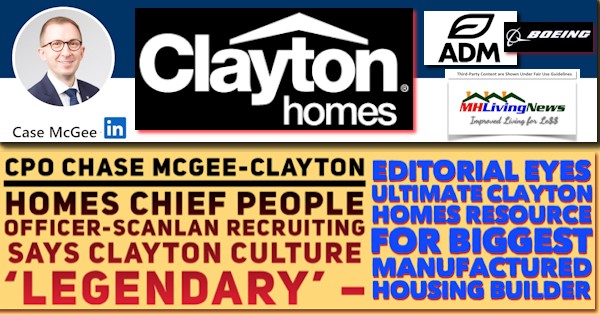


Again, our thanks to free email subscribers and all readers like you, our tipsters/sources, sponsors and God for making and keeping us the runaway number one source for authentic “News through the lens of manufactured homes and factory-built housing” © where “We Provide, You Decide.” © ## (Affordable housing, manufactured homes, reports, fact-checks, analysis, and commentary. Third-party images or content are provided under fair use guidelines for media.) (See Related Reports, further below. Text/image boxes often are hot-linked to other reports that can be access by clicking on them.)

By L.A. “Tony” Kovach – for MHProNews.com.
Tony earned a journalism scholarship and earned numerous awards in history and in manufactured housing.
For example, he earned the prestigious Lottinville Award in history from the University of Oklahoma, where he studied history and business management. He’s a managing member and co-founder of LifeStyle Factory Homes, LLC, the parent company to MHProNews, and MHLivingNews.com.
This article reflects the LLC’s and/or the writer’s position, and may or may not reflect the views of sponsors or supporters.
Connect on LinkedIn: http://www.linkedin.com/in/latonykovach
Related References:
The text/image boxes below are linked to other reports, which can be accessed by clicking on them.

